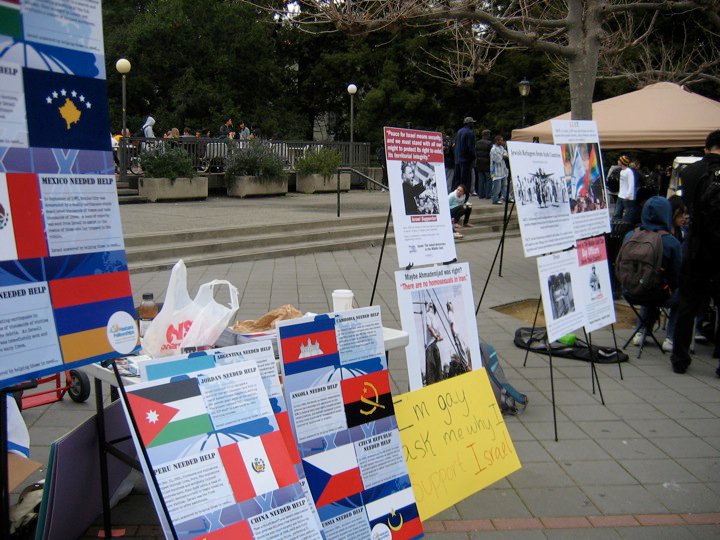A few years ago, I threw myself into the world of student activism and became a proud defender of the Jewish people on campus and online. Like many others, I turned to pro-Israel student organizations for a helping hand, hoping to become a proud and knowledgeable ambassador for Israel on my Canadian campus.
Although I had never felt more dedicated to a singular purpose in my life and became deeply connected with my people’s collective story, I felt something was missing. Reflecting on my experience in these organizations, I’ve started to realize what holds them back from meaningful success.
On campus, pro-Israel students are generally treated by the activist community not as fellow student organizers trying to improve the world, but as foreign agents spreading Israeli state propaganda. It’s not hard to understand why these assumptions are made when pro-Israel students all tend to promote the same basic narrative that has been scripted for them by Israel advocacy organizations: “The Arabs attacked us in 1948 after we Jews had agreed to partition the land into two states, forcing the ‘good guys’ into a war we didn’t want or start (and all we really want is peace).”
Given how the facts are presented and how the narrative is laid out, students seeking support and mentorship from Israel advocacy organizations are conditioned to buy into the two-state paradigm, even if these students themselves aren’t fully convinced of it. Despite Israel advocacy organizations claiming that they want their students to come to their own conclusions, they often present students with a narrative that is only compatible with a narrow two-state paradigm and is therefore missing the passion that would come from students formulating and fighting for their own positions. What’s worse is that this approach, the guiding strategy of pro-Israel organizations for over 20 years, actually prevents students from presenting the story of the Jewish people in a compelling enough manner to actually help the activist community understand our struggle.
As Western campuses become more polarized, we should be encouraging our students to engage in challenging conversations with their peers, including students who are part of pro-Palestinian student clubs. But this is the opposite of what many Israel advocacy organizations tell their students; pro-Israel students are specifically instructed not to engage with the activist community. This may be because these organizations never actually prepare their student ambassadors to engage with a narrative that challenges their own.
Israel advocacy organizations teach students to only engage with others who are neutral or undecided about the conflict so they can essentially impress them with Israel’s cherry tomatoes and technological innovations. But these neutral students have no skin in the game – they’ve heard about the conflict, but it isn’t all too important to them since they are neither Jewish nor Palestinian nor especially politically engaged. If these students really cared, they probably would’ve already picked a side and joined a club, as so many non-Jewish and non-Palestinian allies have.
The way Israel is presented to these neutral students is through a purely Western lens. Pro-Israel students mention Israel’s booming tech industry, the “special” US-Israel relationship, and the countless times Israel has offered to surrender parts of the Jewish homeland for peace. The way the Jewish story is frequently told on campuses merely skims the surface of our people’s thousands of years of rich culture and history.
The Palestinian narrative, by contrast, is a compelling story of an indigenous people fighting to return home and decolonize their land. Palestinian students discuss the injustices done to them and their people. While some Israel advocacy organizations have started to talk about “indigeneity” and “decolonization” in recent years, many of them don’t fully understand what these concepts mean, turning them into surface-level pro-Israel soundbites.
Israel advocacy organizations even go so far as to couple arguments about Jewish indigeneity with messages that present Israel as part of the “civilized West” and praise Israeli leaders for offering to surrender our sacred lands. Not only do messages endorsing a “two-state solution” undermine the Jewish people’s ancient connection to our land, but they also make our entire story appear weak.
If we aren’t willing to fight for our land, could it really be our land?
How can we claim to see ourselves as an indigenous people if we are willing to hand our land over to others so quickly?
But whenever pro-Israel students point out this contradiction, they are often dismissed as “too extreme” by pro-Israel organizations, who frequently limit their students to the officially accepted talking points of pro-Israel advocacy.
Many students subsequently choose not to voice any opposition at all to these organizations and stay within the mold created for them, because they feel, as I felt, that saying something positive about Israel on campus is better than nothing at all, for they have been convinced that an “unapproved” message would undermine efforts to defend Israel.
University students who genuinely care about Israel should absolutely be making themselves heard, but we have consistently said the wrong things to the wrong people – even when it goes against our own instincts. As such, many pro-Israel students aren’t even able to hold productive conversations with Palestinians or their supporters. And rather than acknowledge or address how ill-equipped we actually are for these conversations, we tend to simply dismiss any criticism of Israel as anti-Semitism.
Because the version of Israel’s story that we are given is so incomplete, if we actually were to engage with pro-Palestinian students and learn their narrative, many of us would likely lose our commitment to our own story. But if the organizations responsible for supporting and educating us would teach us our people’s real story, we might actually become capable of engaging with the Palestinian narrative while staying true to our own.
On the surface, Israel advocacy organizations appear to be getting it right; Jewish students on campuses across North America are receiving advocacy training, material support, and even extensive trips to Israel. But the story we are being taught to tell is so narrow and has so many holes that it’s no wonder many young intelligent Jews have left the pro-Israel camp.
Despite all their flaws, the Israel advocacy organizations got me involved in the Jewish community and helped foster my deep connection to my people. They created the space for my personal journey and as such, I want to see them succeed. But how these organizations currently operate is causing many smart and passionate Jewish students to go down a different path because they aren’t being presented with their authentic narrative in a way that encourages them to explore a diverse range of perspectives. This is perhaps because the goal of Israel advocacy appears to be making Western governments and their populations support Israeli policies.
Hasbara organizations need to rework their internal operations in such a way that allows them to define success beyond how many students they send to Israel on subsidized trips. Shifting their focus and resources towards programs that encourage and help Jewish students to explore their own identities and political views on issues relevant to Israel would enable these organizations to experience real success on campuses, where students would learn to represent the Jewish struggle more authentically and actually challenge the toxic conversations currently taking place around Israel.





